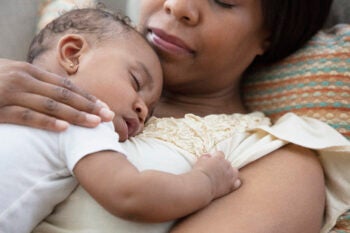Home / Health & Wellness Articles / Mental Health /
How to Cope with a Traumatic Birth Experience

Experiencing childbirth is often envisioned as a joyous and uplifting occasion, but for some parents, it can become a traumatic event that leaves a lasting impact. A traumatic birth experience can result from a variety of factors and can deeply affect the mental and emotional well-being of both the birthing person and their partner.
A study by the Center for Disease Control and Prevention (CDC) found that the maternal mortality rate for White women was 32.9 deaths per 100,000 live births. That same year, the maternal mortality rate for non-Hispanic Black women was 2.6 times higher than that for White women at 69.9 deaths per 100,000 live births. While maternal mortality can occur for any number of reasons, many happen because of a traumatic birthing experience.
Social determinants of health (SDOH) are non-medical factors that influence health outcomes and can lead to less than optimal care for the birthing person and baby and result in a trauma at birth. Things like housing stability, health literacy, provider bias, access to quality services and medical care, and transportation issues can all be factors that can contribute to a traumatic birth experience.
A traumatic birth experience happens when something physically, emotionally, or psychologically traumatizes the birthing parent. “Trauma isn’t just one event,” says Ericka Davis, Licensed Infant and Early Childhood Mental Health Therapist at Centerstone, “it’s how it impacts you that determines how traumatic it is.” Here are a few examples of what can make a birthing experience traumatic:
- Emotional: This could occur after finding out that the baby has a medical diagnosis or health concern after delivery that you weren’t aware of or prepared for ahead of time. This can also happen if you had a specific birthing plan identified ahead of time that you weren’t able to honor for one reason or another.
- Physical: Maybe the epidural was done incorrectly, or for some reason you weren’t able to get medication at all and felt more pain than anticipated.
- Psychological: The birthing parent can develop Post-Traumatic Stress Disorder (PTSD) as a result of giving birth if they experienced intense feelings of fear or helplessness while giving birth.
There are several coping mechanisms birthing parents can use to cope with the effects of a traumatic birth. “Coping skills fall under five different categories, movement, processing, sensory, distraction, and relaxation,” adds Davis. Here are some examples:
- Movement: Go for a walk outside or try yoga or other low-impact exercises to aid recovery.
- Processing: Consider starting therapy as soon as possible to ease symptoms. If a therapist isn’t accessible, try journaling or talking with a friend or family member.
- Sensory: Use fidget toys or a weighted blanket for comfort.
- Distraction: Engage in activities like reading (if possible), listening to audiobooks, music, or podcasts, or watching shows or movies. These can also be played in the background during daily activities.
- Relaxation: Take brief moments for yourself, like practicing deep breathing in the shower or car, to help re-center yourself amidst the challenges of early parenthood.
While a traumatic or difficult birth is often unexpected, doctors can sometimes predict complications. If complications are anticipated, it’s important to prepare. Davis suggests discussing your concerns with a partner, doctor, friend, or therapist. Developing a birth plan that considers potential issues, like the possibility of an emergency C-section, can also be helpful. Ensure you feel comfortable with your choices and have a plan for the post-birth period. Be realistic about your recovery and consider what additional support you may need.
Coping with a traumatic birth experience is a deeply personal journey that requires time, support, and understanding. It’s crucial for those affected to seek professional help, connect with supportive communities, and engage in self-care practices to aid in their healing process. Centerstone is here to help with your healing journey. Call us at 877-HOPE123 (1-877-467-3123) or visit our counseling services page to learn more.


